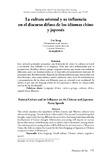La cultura oriental y su influencia en el discurso difuso de los idiomas chino y japonés

View/
Date
2013-09-17Author
Palabras Clave
Lenguaje difuso, cultura griega, cultura china, cognitivismo, discursofuzzy language, Greek culture, Chinese culture, cognitive, speech
Metadata
Show full item recordAbstract
Este artículo pretende presentar una hipótesis de cómo la cultura oriental
y occidental han infl uido en el lenguaje. Ellas han sido infl uenciadas por el
pensamiento fi losófi co chino y griego, respectivamente, que tienen características
diferentes, pero son fundamentales en el desarrollo del pensamiento humano. El
procesamiento de información depende de diferentes factores que interactúan con
el ser humano, tales como cultura y medio ambiente, entre otros. El ordenamiento
y procesamiento de las ideas será diferente para un oriental o un occidental. Se
analiza el por qué del lenguaje difuso de los japoneses o chinos en comparación
con los de los occidentales.
Collections
Información Adicional
| Otros Títulos | Eastern Culture and its Influence on the Chinese and Japanese Fuzzy Speech |
| ISSN | 1856-6812 |
| Resumen en otro Idioma | This article examines the hypothesis of how Eastern and Western cultures have infl uenced language. Th ey have been infl uenced by Chinese and Greek philosophical thought, respectively, having diff erent characteristics, but being fundamental in the development of human thought. Information processing will depend on various factors that interact with humans, such as culture and environment, among others. The ordering and processing of ideas will be diff erent for an Easterner or a Westerner. Hence the wish to analyze the reason for the fuzzy language of Japanese or Chinese compared to that of Westerners. |
| Colación | 171-185 |
| Periodicidad | Semestral |
| País | Venezuela |
| Institución | Universidad de Los Andes |
| Publicación Electrónica | Revista Humania del Sur |
| Sección | Revista Humania del Sur: Caleidoscopio |





